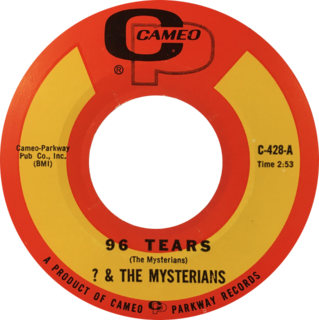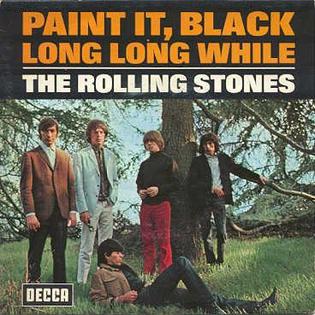Related Research Articles
? and the Mysterians are an American garage rock band from Bay City and Saginaw in Michigan, initially active between 1962 and 1969. Much of the band's music consisted of electric organ-driven garage rock and an enigmatic image inspired by the 1957 Japanese science fiction film The Mysterians. In addition, the band's sound was also marked by raw-resonating lead vocals of "?", making Question Mark and the Mysterians one of the earliest groups whose musical style is described as punk rock. Their music and imagery were highly influential on later bands.

Gerry and the Pacemakers were a British beat group prominent in the 1960s Merseybeat scene. In common with The Beatles, they came from Liverpool, were managed by Brian Epstein, and were recorded by George Martin. Their early successes alongside the Beatles were instrumental in popularizing the Merseybeat sound and launching the wider British beat boom of the mid-1960s.

Manfred Mann were an English rock band, formed in London and lasting from 1962 to 1969. The group was named after their keyboardist Manfred Mann, who later led the successful 1970s group Manfred Mann's Earth Band. The band had two different lead vocalists, Paul Jones from 1962 to 1966, and Mike d'Abo from 1966 to 1969.

The Boomtown Rats are an Irish rock band originally formed in Dublin in 1975. Between 1977 and 1985, they had a series of Irish and UK hits including "Like Clockwork", "Rat Trap", "I Don't Like Mondays" and "Banana Republic". The group is led by vocalist Bob Geldof. The original line-up comprised Geldof, Garry Roberts, Johnnie Fingers (keyboards), Pete Briquette (bass), Gerry Cott and Simon Crowe (drums). The Boomtown Rats broke up in 1986, but reformed in 2013, without Fingers or Cott.

The Pretty Things were an English rock band, formed in September 1963 in Sidcup, Kent. They took their name from Willie Dixon's 1955 song "Pretty Thing". A pure rhythm and blues band in their early years, with several singles charting in the United Kingdom, they later embraced other genres such as psychedelic rock in the late 1960s, hard rock in the early 1970s and new wave in the early 1980s. Despite this, they never managed to recapture the same level of commercial success of their early releases.
Zager and Evans was an American rock-pop duo active during the late 1960s and early 1970s, comprising Denny Zager and Rick Evans. They are best known for their 1969 No. 1 hit single "In the Year 2525", which earned them one-hit wonder status.

"96 Tears" is a song recorded by the American garage rock band? and the Mysterians in 1966. In October of that year, it was #1 on the Billboard Hot 100 in the U.S. and on the RPM 100 in Canada. Billboard ranked the record as the #5 song for 1966. It is ranked #213 on the Rolling Stone list of the 500 Greatest Songs of All Time. On November 11, 1966, the single was certified as gold by the RIAA.

Ten Years After are a British blues rock band, most popular in the late 1960s and early 1970s. Between 1968 and 1973, Ten Years After scored eight Top 40 albums on the UK Albums Chart. In addition they had twelve albums enter the US Billboard 200.

The Brothers Four is an American folk singing group, founded in 1957 in Seattle, Washington, and known for their 1960 hit song "Greenfields".

Marmalade are a Scottish pop rock band originating from the east end of Glasgow, originally formed in 1961 as The Gaylords, and then later billed as Dean Ford and The Gaylords, recording four singles for Columbia (EMI). In 1966 they changed the band's name to The Marmalade, and were credited as such on all of their subsequent recorded releases with CBS Records and Decca Records until 1972. Their greatest chart success was between 1968 and 1972, placing ten songs on the UK Singles Chart, and many overseas territories, including international hits "Reflections of My Life", which reached #10 on the US Billboard Hot 100 Chart and #3 on the UK Chart in January 1970, and "Ob-La-Di, Ob-La-Da", which topped the UK chart in January 1969, the group becoming the first-ever Scottish group to top that chart.

The Tremeloes are an English beat group founded on 1958 in Dagenham, Essex. They initially found success in the British Invasion era with lead singer Brian Poole, scoring a UK chart-topper in 1963 with "Do You Love Me". After Poole's departure in 1966, the band achieved further success as a four-piece with 13 Top 40 hits on the UK Singles Chart between 1967 and 1971 including "Here Comes My Baby", "Even the Bad Times Are Good", "(Call Me) Number One", "Me and My Life" and their most successful single, "Silence Is Golden".

The Shadows were an English instrumental rock group. They were Cliff Richard's backing band from 1958 to 1968 and on numerous reunion tours. The Shadows have had 69 UK chart singles from the 1950s to the 2000s, 35 credited to the Shadows and 34 to Cliff Richard and the Shadows. The group, who were in the forefront of the UK beat-group boom, were the first backing band to emerge as stars. As pioneers of the four-member instrumental format, the band consisted of lead guitar, rhythm guitar, bass guitar and drums. Their range covers pop, rock, surf rock and ballads with a jazz influence.

Five Americans was a 1960s American rock band, most famous for their song, "Western Union", which reached number five in the U.S. Billboard chart and was their only single to chart in the Top 20.

"Paint It Black" is a song recorded in 1966 by the English rock band the Rolling Stones. A product of Mick Jagger and Keith Richards' songwriting partnership, it is an uptempo song with Indian, Middle Eastern and Eastern European influences and features lyrics about grief and loss. London Records released the song as a single on 7 May 1966 in the United States; Decca Records released it on 13 May in the United Kingdom. London Records included it as the opening track on the American version of the band's 1966 studio album Aftermath.

The Spencer Davis Group were a British rock band formed in Birmingham in 1963, by Spencer Davis (guitar), brothers Steve Winwood and Muff Winwood, and Pete York (drums). Their best known songs include the UK number ones "Somebody Help Me" and "Keep on Running", "I'm a Man" and "Gimme Some Lovin'", which reached #2 in the UK and #7 in the US.

John Dalton is a British bass guitar player, best known as a member of The Kinks in 1966 and between 1969 and 1976, replacing original member Pete Quaife.
The Creation was an English rock band, formed in 1966. Their best-known songs are "Making Time", which was one of the first rock songs to feature a guitar played with a bow, and "Painter Man", which made the Top 40 in the UK Singles Chart in late 1966, and reached No. 8 in the German chart in April 1967. It was later covered by Boney M in 1979, and reached the No. 10 position in the UK chart. "Making Time" was used in the movie Rushmore, and as the theme song from season 2 onwards of The Great Pottery Throw Down.

The Equals are an English pop, R&B and rock group formed in North London in 1965. They are best remembered for their million-selling chart-topper "Baby, Come Back", though they had several other chart hits in the UK and Europe. Eddy Grant founded the group with John Hall, Pat Lloyd, and brothers Derv and Lincoln Gordon, and they were noted as being "the first major interracial rock group in the UK" and "one of the few racially mixed bands of the era".
The Silkie were an English folk music group. Their name was derived from an Orcadian song "The Great Silkie of Sule Skerry", which they sometimes performed. They were briefly considered to be the English equivalent of Peter, Paul and Mary, with their common repertoire of Bob Dylan songs, and the original Australian folk group, The Seekers.

Ashton, Gardner and Dyke were a British rock trio, most popular in the early 1970s. They are best remembered for their song, "Resurrection Shuffle", a transatlantic Top 40 one-hit wonder in 1971.
References
- 1 2 3 4 5 Colin Larkin, ed. (1992). The Guinness Encyclopedia of Popular Music (First ed.). Guinness Publishing. pp. 1617/8. ISBN 0-85112-939-0.
- 1 2 "The Mark Four". Kastoffkinks.co.uk. Retrieved 28 January 2015.
- ↑ Richie Unterberger. "The Mark Four - Biography - AllMusic". AllMusic . Retrieved 28 January 2015.